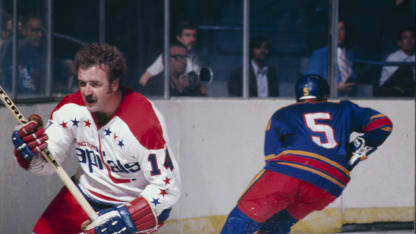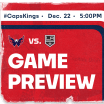Washington's June 1974 expansion draft provided such an obvious dearth of hockey talent that original Caps general manager Milt Schmidt spent a chunk of that summer of 1974 searching for any veteran NHL talent he could find. As former GM of the Boston Bruins, Schmidt went with what he knew, acquiring a trio of players he knew well from his days in Beantown.
Defenseman Doug Mohns – the Caps’ first captain – was purchased from the Atlanta Flames; he played his final NHL season with Washington as a 41-year-old in 1974-75. Until Zdeno Chara joined the Caps in 2020-21, Mohns had been the oldest player ever to suit up for Washington.
Former Boston farmhand Bill Lesuk had established himself as a defensive-minded bottom six forward with Philadelphia and Los Angeles, and Schmidt purchased him from the Kings.
And finally, Schmidt pried veteran forward Tommy “The Bomber” Williams from Boston for cash.
One of the fastest skaters in the NHL throughout the 1960s, Williams was also one of the few American players in the circuit for much of the decade, and as such, he was an inspiration to young players in the States at the time.
After helping the U.S. to an Olympic Gold Medal – he was the youngest member of the 1960 Squaw Valley team and he assisted on the game- and medal-winning goal – Williams began his pro career, signing with the Boston Bruins. He was one of only five U.S.-born players to play in as many as 100 NHL games throughout the 1960s, and he led all American-born players in games, goals, assists and points during that decade. Williams and brother Butch were the first set of American brothers to play in the NHL.
(Fun fact: When Tommy Williams scored his first NHL goal against Chicago’s Glenn Hall on Jan. 27, 1962 at Boston Garden, Andre Pronovost – the grandfather of former Caps winger Anthony Mantha – supplied the primary helper.)
After eight years with the Bruins, Williams was dealt to the Minnesota North Stars in May, 1969; Schmidt and the Bruins’ braintrust were worried that Williams’ career might be over after a knee injury at age 28 cost him most of the 1968-69 season.
In 1969-70, his first season with the Stars, Williams established a career high with 67 points and was third in the NHL with 52 assists, trailing only former Boston teammates Bobby Orr (87) and Phil Esposito (56). Tragically, Williams’ wife Emily passed away in November of 1970, leaving him a widower with five young children.
Williams was traded to the California Golden Seals in February of 1971 and his NHL rights were traded back to the Bruins a year later. Williams instead chose to sign with the New England Whalers of the upstart World Hockey Association. He scored the first goal in Whalers’ franchise history and spent two years there, scoring 21 goals during the 1973-74 season.
Williams led the Capitals in scoring in the club’s first season, totaling 22 goals and 58 points. It was his first 20-goal season in the NHL since 1962-63. The 34-year-old had proven there was still some life in his legs, but the Caps were a miserable lot, posting an anemic 8-67-5 record.
When the club won its first (and only) road game in its third-to-last away contest that year, it was Williams who led his happy bunch of teammates back onto the ice and held aloft the dressing room garbage can from the Cow Palace, the home of the vanquished California Golden Seals, one of Williams’ previous NHL employers.
Forty-nine years ago this week, the Capitals were in the midst of the worst stretch of hockey in the franchise’s history, a 25-game winless streak. (The winless stretch ran from Nov. 29, 1975 through Jan. 23, 1976. The team went 0-22-3 during that span, leading to the resignation of coach and GM Schmidt.) In the middle of his second season with the Caps, Williams – the oldest player on the team at 35 – came to the realization that eventually graces all athletes. It was time to retire. He missed his kids and he felt as though he was an old body filling a sweater that should go to a man with younger and fresher legs.
Williams made the decision to retire sometime in early December and played his final NHL game in a 14-2 blowout loss at Buffalo on Dec. 21, 1975. It remains the worst defeat the Caps have ever suffered.
After pulling off his skates for the final time, Williams spoke with Russ White, beat writer for The Washington Star on his thoughts as his retirement loomed ahead. That poignant piece (below) appeared in The Star on Christmas Day, 1975.
Williams was inducted into the U.S. Hockey Hall of Fame in 1981. He retired to his home in Hudson, MA where he passed away on Feb. 8, 1992 at the age of 51.
Maybe the “The Bomber” never got his last blaze of glory, but his memory blazes on. The mere mention of his name to former teammates still elicits warm smiles and funny stories.
The Washington Star, Thursday, December 25, 1975
“That Last Blaze of Glory Never Happened for Tommy Williams”
Tommy Williams, a widower, has gone home to spend Christmas with his five children in Duluth, Minn. He is not coming back to play for the Washington Capitals. After 16 years as a professional hockey player, starting after he helped the U.S. win the gold medal in hockey in the 1960 Olympics, Williams, 35, has retired. This is what he told Washington Star staff writer J. Russell White about his thoughts on retirement:
“Now I can stop wondering what it’s like to find out when you have suited up for the last time. Today I know. In a way it is comforting. I’m grateful that I was able to play as long as I did – 16 years.
“I wanted to go out in one great blaze of glory. For the last few weeks, I’ve been dreaming about that. I wanted to go out like Ted Williams did in Boston. Remember that last game he had? Old Teddy hit a home run that last time up at Fenway Park. A real blaze of glory.
“The Bomber didn’t get his blaze. What I ended up with was a 14-2 loss to the Buffalo Sabres. Thank heavens for the safety. And then I almost got myself into a fight the other day at practice. Seems like everyone else was getting angry so I pretended I was mad and dropped my gloves, too. Ace Bailey told me I must be crazy. Maybe Ace is right.
“I’m leaving the Caps with no bad feelings at all. I would like to be with them when they start winning but it looks like I can’t wait that long. Three wins in 34 games isn’t my idea of success. It’s best the team goes with the kids who have the desire to pick themselves up from a record like that. I’m afraid that at my age you lose heart. It’s been awfully tough to get myself up for the last two weeks.
“Last year I gave everything I had to the team. I wanted to show people that I could still play. Maybe I helped, maybe I didn’t. But I know I didn’t quit. [Williams led his team in scoring last year with 58 points.]
“I was going all right this year when we started. I was even telling myself that the Caps were going to be like the Islanders and win more games. The Caps will be the Islanders someday, but they won’t get there with guys like me. What they need are the kids who will go out and hit somebody.
“Who’s kidding who, anyhow? I haven’t hit anyone in years. I have had my good times. And I enjoyed certain games like that one against Boston last week. I would really like to have helped pull that one out. [The Caps lost 3-2 to the Bruins.] And the game with Philadelphia was another good one for the team even if it was another loss [7-5]. The Flyers came at us all night and they tried like hell to intimidate our kids and were dishing it out right to the end, but we managed to hold on. But we lost.
“I hated losing. I hated even more to go to practice after a loss. I hated the last couple of weeks because we haven’t won a game this month.
“My legs seemed heavier each time I skated. A couple of times I was ready to come in and say, ‘Look, maybe this is it, I’m just not helping anymore.’ But I just couldn’t do that. I wanted to go a little bit more, maybe find that last blaze of glory.
“Finally we talked, Milt Schmidt and I. He’s the guy who brought me into this league 16 years ago. Milt was always good to me and he’s very good to me now as I leave. I’m going to be with my children for Christmas and I have some people to talk to about a job in Massachusetts. I’m going to do all right. I’m not a hard guy to get along with.
“One of the kids on the team – Tony White – just said goodbye and asked me if he could wear my jersey (No. 14). I said, ‘Sure, kid. Sure, kid, but you better make sure they take in the stomach. I’m afraid I stretched it out a bit. Good luck, Tony boy, and good luck to the Caps.’”



















